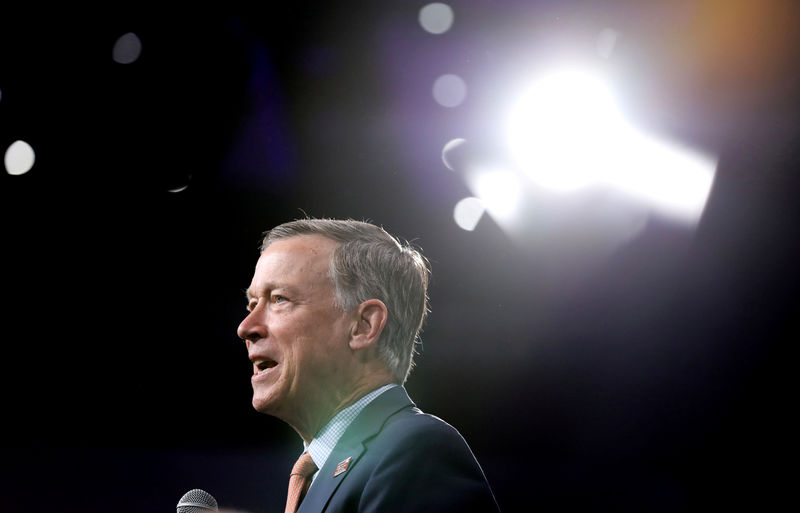By Sharon Bernstein
(Reuters) - Former Colorado Governor John Hickenlooper dropped his bid for the 2020 Democratic presidential nomination on Thursday after his centrist campaign failed to catch fire amid two dozen hopefuls seeking to challenge Republican President Donald Trump.
Hickenlooper, who hinted he might instead run for a U.S. Senate seat in Colorado, left the presidential race after it became apparent he did not have enough financial backers or support in opinion polls to make the party's debate stage next month.
Several of his top aides quit earlier this summer after urging the former businessman and Denver mayor to find a graceful way to end his campaign.
Hickenlooper, 67, remains popular in Colorado and has been urged by numerous Democrats, including Senate Minority Leader Chuck Schumer, to challenge incumbent Republican Cory Gardner for his Senate seat in that state. Hickenlooper on Thursday said he would give the idea "serious thought."
"I’ve heard from so many Coloradans who want me to run for the United States Senate," he said in a statement. "They remind me how much is at stake for our country."
Buoyed by distaste for Trump and unprecedented efforts to register new voters in key districts, Democrats took control of the U.S. House of Representatives last year, giving the party greater power to stymie Republican policies and advance their own. A takeover of the Senate would allow Democrats to effectively block Trump's efforts to nominate conservative judges and pass new laws even if Trump is re-elected in November 2020.
Hickenlooper rose to prominence after founding a brewpub credited with helping to revive a faded part of Denver. A former geologist whose industry evaporated just as he was beginning that career, he made the case that he understood the plight of workers who lost their jobs because of industrial changes.
On the presidential campaign trail, he took on members of the Democratic Party's progressive wing, saying the embrace of the word "socialism" by rival Bernie Sanders would alienate moderates whose support Democrats would need to defeat Trump.
Hickenlooper styled himself as an outsider to Washington politics who brought environmentalists and oil company executives to the table to craft energy policy, and presided over his state’s pioneering but complicated transition to legalized marijuana.
But since entering the White House contest in March, he has barely registered with voters, polling at around 1% in several surveys. His fundraising also lagged competitors, raising just $3 million since the beginning of the 2020 election cycle. By comparison, front-runner Joe Biden raised $22 million, Sanders took in $46 million and Trump $124 million.
Known but tolerated in his home state for being somewhat prone to verbal gaffes, Hickenlooper raised eyebrows at a CNN town hall in March after he was asked whether he would consider choosing a woman for his vice president should he clinch the nomination.
Hickenlooper said he would but added, "How come we're not asking, more often, the women, 'Would you be willing to put a man on the ticket?'"

The response, predictably, led to an uproar on social media. "RIP #Hickenlooper campaign," one commenter wrote.